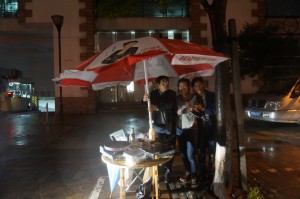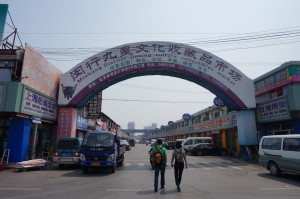After a month of living in Shanghai as a study abroad student and experiencing what can only be understood as a place burgeoning with opportunity with little regulations, a friend and I took hold of the chance to establish a street food stand in the midst of Shanghai’s thumping nightlife. We infiltrated Shanghai’s underground economy, immersed ourselves in the local street food culture by using food as our entryway, just as Chinese peasants did when they adapted to life in an urbanizing landscape.
In between classes one day, we made a trip to the Hotel Supply & Equipment store, a four story building that was fully stocked to supply a luxury hotel restaurant. We bought two stoves, a metal fold-up stand, two flat-top skillets, a spatula, a few containers, and some butane tanks–spending a total of about 650 yuan. After this investment, there was no going back.
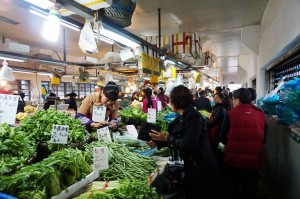
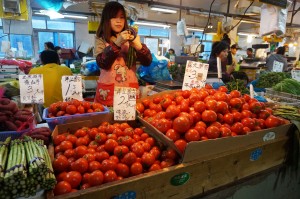
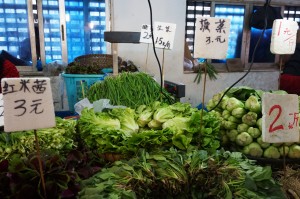
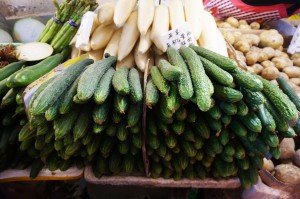
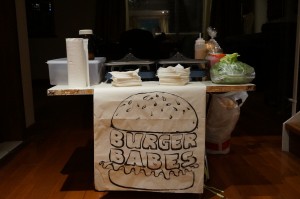
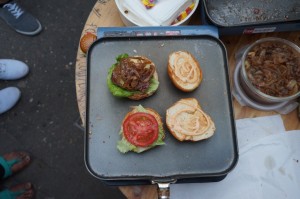 Finding a board to use as our table was simple enough as walking past one of the many tricycles stacked with wooden scraps on the street. We initially sourced our ingredients such as produce and meats from a two story wet market nearby the kitchen we worked out of.
Finding a board to use as our table was simple enough as walking past one of the many tricycles stacked with wooden scraps on the street. We initially sourced our ingredients such as produce and meats from a two story wet market nearby the kitchen we worked out of.
On our first night out, we tentatively made our way out to Huaihai Lu. It was, as we soon realized, a road too clean, too capitalized by glitzy clubs and lavish malls to be occupied by street food vendors. We decided to head to our second location, The Shelter, located in a more residential area and on the same street as a smaller bar and lounge. There was a crowd in front of the club and flashing cop lights across the street, reminding me of the risk that we were putting ourselves in–it wasn’t just the fact that we were setting up an illegal business in China, it was the fact that we were a foreign street vendor. We had previously discussed the legal and moral implications of being a foreign street food stand among poor hawkers trying to make enough money to get by. We understood the risk we were putting ourselves into; but to us, the thrill of starting a business, let alone one set up on the street alongside local chefs and entrepreneurs of the informal economy, motivated us to confront whatever negative or positive incidences that came our way.
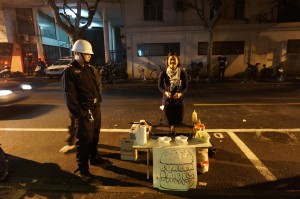
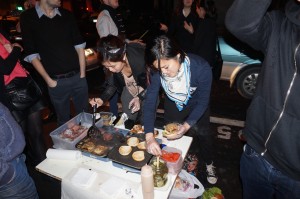
Indeed there were times we struggled–like our first night out when our stand had been stolen within the five minutes we had gotten to the club. A police officer walked up to us and informed us a foreigner had grabbed it and walked away in the few moments it left our gaze while we scoped out the crowd in front of Shelter. We quickly realized how little it took to become a business in China, looking past our misfortune and creating a makeshift table by balancing the wooden board on top of our suitcase. We sold all of our ten burgers that night, painfully squatting the entire time. We somehow even befriended the police officer, who frequently hung around our stand the next few times we set up in front of shelter urging others to buy our burger. Other vendors seemed even more curious and fascinated that two Chinese girls our age were up at this hour selling hamburgers.
It was clear that our stand had an advantage. Although we both appeared Chinese at glance, we knew how to make American food well, and how to defend the safety and taste of our food in both Chinese and English. The idea of representing ourselves as a “pop-up restaurant,” quickly caught on. It was a term that would work towards progressively legitimizing ourselves as a food business, and it was a term that was familiar to our target demographic–the expats. We remained in a “safe” place from governmental intervention because our stand only existed in a time and space that tended to turn a cold shoulder to social disruptions and questionable legalities.
One night, we set up our stand at the end of an expat bar street, Yong Kang Lu, under the steady mist of rain that shed a seemingly permanent overcast over that entire day. No one was buying burgers inside The Rooster, an American bar that we began to pop-up at since they added a kitchen that could accommodate us, or outside on the street. The longest interaction we had was with a few traffic police guards who got us a giant umbrella and began taking pictures with us. Despite the gloomy weather, we ended up getting approached to participate in a “spring fling” fundraiser event hosted by a photography studio in Shanghai. We had to raise our production from an average of 30 burgers to about 250.
In preparation for the event, we tagged along with the owner of The Rooster to source cheaper cookware and equipment for our stand. He took us to a place that his ayi told him about, a kitchen and hardware market called the Jiu Xing Market in Minhang District that spanned 9 city blocks. We soon realized that this was the place that all local street vendors and hole-in-the-wall business owners went to get everything from mini plastic bags to customizable steel woks. We sat down with a steel shop to see how much it would cost to design our own flat-top griddle, experiencing the firsthand processes of becoming a true Chinese street food stand.
Our business grew from embracing the urban form of a street food stand to becoming a hip and unique pop-up street food stand/restaurant that has been approached by the artists, event-planners, photographers, DJs, and bloggers of Shanghai’s creative class. Over the past three months, we’ve traversed the informal economy into the formal one that legitimizes our business as one that is a part of a trending culinary movement that is now occurring across the globe. City weekend describes Shanghai as the perfect location, “with its high rents, strong competition, and curious diners, it’s the perfect breeding place for the kind of culinary experimentation that is the lifeblood of pop-up restaurants.”

